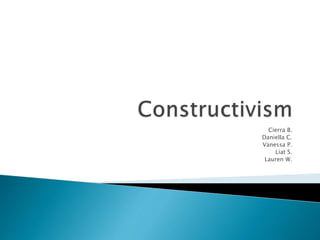
Constructivism
- 1. Cierra B. Daniella C. Vanessa P. Liat S. Lauren W.
- 2. *(photo from Wikimedia Commons, see credits) Cognitive Psychologist Four Cognitive Stages: ◦ Sensorimotor (birth- 2 yrs): learn through what they feel, see, touch, hear, smell and motor skills; do not understand the outside world yet. ◦ Preoperational (2- 6/7 yrs): egocentric, start to understand/use symbols and numbers, develop concrete thought. ◦ Concrete Operational (6/7 yrs- 11/12 yrs): use logical thinking, understand outside perspectives. ◦ Formal Operational (11/12 yrs- adult): abstract thinking develops, understand cause and effect. Adaptation: sense of cognitive understanding and development. Assimilation: incorporate new experiences and knowledge into the mind. Accommodation: change their ideas to fit in the new information in a way that makes sense. Children learn through active analysis of a subject.
- 3. American Psychologist Believed that learning is an active process where new ideas are formed based on prior and present knowledge. Discovery Learning: based on inquiry and exploration that results in greater retention. Socratic Method: students learn problem analysis, critical thinking on perspectives and outside opinions, how to defend their stances. Spiral curriculum: always building upon prior knowledge. Benefits of Discovery Learning: ◦ Engaging ◦ Motivation ◦ Instills responsibility and independence ◦ Fosters creativity ◦ Develops problem solving skills ◦ customized learning Criticisms: ◦ Can breed cognitive overload ◦ Potential for misconceptions ◦ Failure to notice problems *(information from learning-theories.com, see credits)
- 4. WHAT HE BELIEVED… Russian educational psychologist Social cognition- he believed that learning was influenced significantly by social development Said that a child’s social and cultural environment can have a positive or negative affect on their cognitive development Zone of proximal development- the difference between what the child can do on their own and what they can do through collaboration with a more advanced peer or teacher. HOW HE APPLIED IT.. Collaborative learning is a way for students to learn with the aid of a peer or adult what they couldn’t on their own. They learn through observing and understanding new concepts and ideas. Scaffolding- the process by which teachers discover the level of each child’s development and construct their learning experiences based off that point Anchored instruction- a form of instruction where the student already has learned concepts and information, which form a basis for other information to connect with and build upon
- 5. Educational psychologist, philosopher, political activist Advocate for child- centered instrucition In 1896 he opened the a Laboratory school, which came to be known as the “Dewey school” Thought that learning should be student- directed with teacher’s there as a guide for resources He was a part of a movement called progressive education, which focused on educating the whole child (mentally, psychically, and socially) He also believed in pragmatism, which was the belief that the truth of a theory could be determined only if a theory worked. He said theories are only valuable for practical application.
- 6. Students learn by doing ◦ Actively participate in learning process ◦ Learn critical-thinking skills ◦ Learner forms much of what they learn or comprehend Integrated curriculum must be emphasized ◦ Students learn subjects in various ways by doing different activities and incorporating technology It is important for students to work together to learn new information ◦ New ideas and different perspectives are brought about by doing so
- 7. Teachers: Pose questions and problems, and then guide students to find their own answers. They may use inquiry, which is prompting student to form their own questions. Collaborative learning would be used as well, which is the process of encouraging group work and the use of peers as resources. Software simulations are great means for allowing hands on learning and collaboration. Students: Students come to the classroom with previously formulated knowledge, ideas, and concepts. This knowledge is used as the basis for new knowledge that will be created. Students may collaborate together to make video/powerpoing presentations instead of writing papers or illustrating a poster.
- 8. Try to use raw data and primary sources, in addition to manipulative, interactive, and physical materials. Encourage communication between the teacher and the students and also between the students. Ask follow up questions and seek elaboration after a student's initial response. Provide enough time for students to construct their own meaning when learning something new. Encourage and accept student autonomy and initiative.
- 9. Graphics: ◦ Jean Piaget– Taken from Wikimedia Commons, uploaded by Roland Zumbuhl Information: ◦ Integrating Technology and Digital Media in the Classroom, 6th Edition by Shelly, Gunter and Gunter. ◦ http://www.learning-theories.com/discovery- learning-bruner.html ◦ http://www.thirteen.org/edonline/concept2class/c onstructivism/index_sub2.html